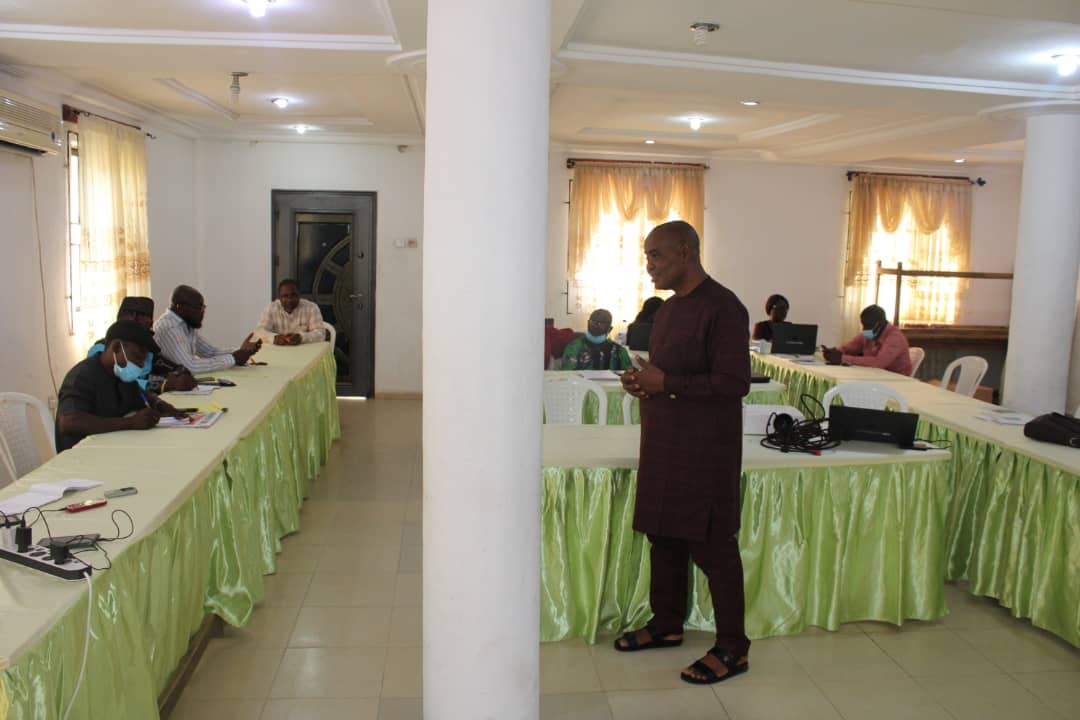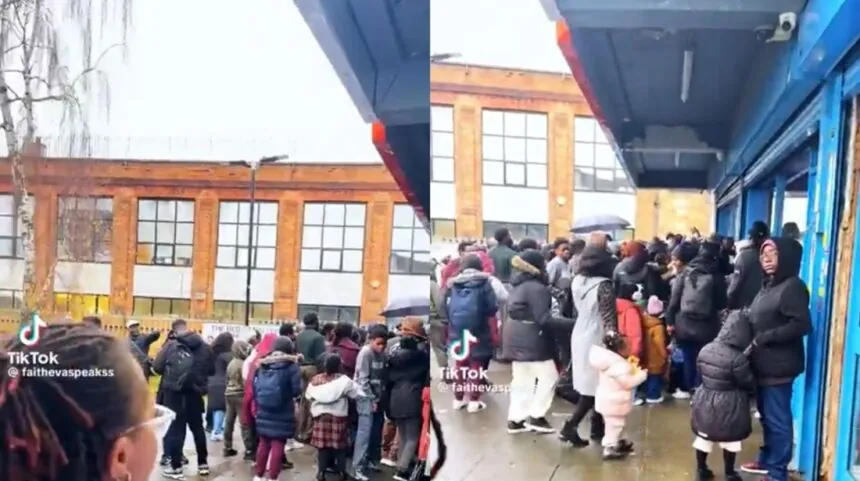Headline
Edo: LIFE-ND Trains 250 Persons In Agric Business, Empowers 82 With Working Capital

By Joseph Kanjo, Benin
The State Project Coordinator, Livelihood Improvement Family Enterprises in the Niger Delta (LIFE–ND), Mr. Jude Ekpu, says no fewer than 250 persons known as ‘incubatees’ have been trained in various agric businesses such as fishery, poultry, cassava production and rice production in Edo State within one year.
According to him, under the project in Edo State, no fewer than 82 incubates have been disbursed working capital after the training, adding that when others are done with their training, they would be disbursed too.
He added that 10 local government areas out of the 18 in the state have been selected for the implementation of the project with 10 communities selected in each LGA for the project.
INFO DAILY reports that LIFE-ND is a Project for the Niger Delta designed in collaboration with Federal Government of Nigeria (FGN), the International Fund for Agriculture Development (IFAD) and the Niger Delta Development Commission (NDDC) with counterpart fund from Edo State Government.
The state Project Coordinator who disclosed this in Benin, during the weekend, at an interactive session with newsmen, noted that the project is aimed at “developing supply of skilled youth labour using the incubation model which, according to him, is to ensure a successful rural agrobusiness.”
READ ALSO: CAN: Fish Out 61 Abducted Baptist Worshippers, Or …
He noted that this is to be “conducted in a way to mentor neighbouring youths to produce greater volumes, leading to higher value enterprises and community incomes, and jobs for the youth.” (sic)
“Within a year of our activities as a project office, the State Project has trained 250 incubatees and 50 incubators, with 125 incubatees and 25 incubators trained in two sets.
“Over 50 communities have donated land resource for effective project implementation. Over 1800 hectares of land has been secured under our land identification and land securing process as farmland for the incubatees. (sic)
“The target beneficiaries of the LIFE-ND project are youths and women in the Niger Delta Region of Nigeria. The target beneficiaries are the unemployed and under-employed youth aged 18-35 years and unemployed women who are heads of household with children less than 15 years of age.
“The percentage distribution of targets beneficiaries are as follows: -50% male youth, -20% female (women) and -30% female youths,” he said.
On her part, the National Agrobusiness Promotion Coordinator, LIFE-ND, Mrs Esenwa Anthinia, said, “Our target is for about 4,250 youths and women-headed households to benefit from the project. Some of the incubatees, it is hoped, will later become incubators in the project after being empowered.”
She noted that, “The project came to Edo State following the success of the previously sponsored IFAD Programme, Community Based Natural Resource Management Programme – Niger Delta (CBNRMP-ND).”
Earlier, the Communication Officer of the project in Edo State, Mr. Benedict Akhamie, solicited media support and cooperation, stressing that if LIFE-ND is not projected to the public through the media, no one will know such project exist.
READ ALSO: Community Rises To End Gender Based Violence
Headline
EU Fines Elon Musk’s X €120m For Violating Digital Content Rules

Elon Musk’s social media platform, X, has been hit with a €120 million ($140 million) fine by European Union tech regulators for violating multiple provisions of the EU’s Digital Services Act (DSA).
This marks the first significant penalty imposed under this landmark legislation.
On Friday, the European Commission announced the fine, citing various violations by X, including misleading platform features and a lack of transparency in research practices.
READ ALSO:Elon Musk Deletes Post Claiming Trump Was ‘In The Epstein Files’
Regulators pointed out that one of the violations involved the misleading design of the blue verification checkmark. This feature is now linked to subscription payments instead of identity validation, which the EU described as “deceptive and potentially harmful.”
The Commission also criticized X for not maintaining transparent advertising records and for restricting researchers’ access to publicly available data on the platform.
This ruling is likely to heighten diplomatic tensions between Brussels and Washington. U.S. officials from the Trump administration had previously condemned Europe’s regulatory approach toward major tech companies, claiming that EU policies unfairly target American firms and restrict free expression.
READ ALSO:Elon Musk Joins ‘Cancel Netflix’ Campaign
However, the European Commission defended its stance, stating that enforcement under the DSA is not influenced by nationality. They emphasized that the legislation is designed to promote online accountability, protect users, and ensure transparency in digital operations—standards that are increasingly becoming global benchmarks.
“The DSA does not discriminate by company origin,” the Commission argued, maintaining that the penalties reflect Europe’s commitment to protecting democratic values and responsible digital governance.
The fine marks a significant test case for the EU’s new regulatory regime and could set precedent for similar action against other platforms not in full compliance with the law.
Headline
Nigerian Ringleader Of Nationwide Bank Fraud, Money Laundering Jailed In US, Says FBI

The Federal Bureau of Investigation (FBI) has announced the sentencing of Nigerian national Oluwaseun Adekoya, the mastermind behind a sprawling bank fraud and money-laundering operation that targeted victims across the United States.
According to investigators, Adekoya, who operated under multiple aliases including “Ace G.,” “BRODA,” “Legendary,” “SANTA,” “SANTANA,” “Sammy LaBanco,” “Sean Maison,” and “Kiing_maison” led a sophisticated criminal network that stole and laundered more than $2 million by impersonating individuals nationwide.
The FBI said the long-running operation, internally code-named Operation Catch Me if You Can, relied on coordinated efforts across numerous law enforcement and banking agencies.
READ ALSO:
FBIAlbany headed the investigation, working with partners across the country to dismantle Adekoya’s organisation and secure justice for affected victims.
As part of the announcement, FBI Albany Special Agent in Charge Craig Tremaroli said, “Mr. Adekoya spent almost two decades of his life creating a massive criminal network that stole from hard-working Americans. This sentence ensures he’ll spend the next two decades of his life in federal prison.
“The FBI is grateful to the numerous law enforcement and banking institution partners who provided the assistance needed to take down Mr. Adekoya and his associates and ensure justice for the victims. We remain deeply committed to using every resource available to investigate and bring to justice any individual or organization focused on defrauding our citizens.”
READ ALSO:
Adekoya has now been sentenced to 20 years in federal prison.
According to the FBI, the case demonstrates its continued commitment to combating financial crimes and protecting Americans from fraud schemes that are growing in scale and sophistication.
Headline
VIDEO: Nigerians In UK Lament Delayed Passport Capturing At ‘Crowded’ Birmingham Centre

Nigerians in the United Kingdom (UK) have cried out to the Nigerian authorities over delays in renewing their international passports, describing the capturing experience as frustrating.
According to a video from the Nigerian Passport Intervention Centre in Birmingham, sighted by Tribune Online, hundreds of people are seen lurking around while waiting for officials to arrive for the exercise.
In the video, a lady narrated how the crowd had gathered since around 4am on Friday after their names had been taken down the previous day with the promise that the capturing would be done the next day.
“They promised they’re going to start at 9am and at 12pm when I was leaving, they’ve not even started attending to people. We heard that the officials were not even at the scene,” she said.
READ ALSO:US Imposes Visa Restrictions On Nigerians Linked To Religious Freedom Violations
Continuing, the video showed the arrival of some of the officials, whom the lady said had asked the crowd to return the next day.
“While I was walking to my taxi, I saw some of the officials. I recognised them from yesterday when he addressed the people saying ‘Go and come back tomorrow’. The one driving that car was the one who was addressing us yesterday,” she added, referring to a vehicle in the viral clip.
The lady further criticised their attitude to the plight of Nigerians at the centre, saying many, including herself, came with babies.
“It’s so shameful that Nigeria will still happen to you even if you’re outside Nigeria. It’s the people, not only the government,” she added.
READ ALSO:Trump Unveils Fast-track Visas For World Cup Ticket Holders
Reacting to the video, another user simply identified as OduduAbasi Umo-Odiong, posted two short clips showing people agitated at the centre.
“People are already getting agitated today. The frustration is rising and the situation is becoming tense,” he captioned.
However, an X user, identified as Williams Ibironke, disagreed with the information in the video, saying the officials work till midnight.
“The information she posted was purposely made as content to miss direct people. those pple are working til midnight everyday, they closed @3am so how can they resume early again. I did mine @12:33am this morning and I still left people there, meaning they may not close until 2am,” he posted.
READ ALSO:Trump Orders Tougher Visa Screening Regime
Other X users reacting to the video called on the Minister of Interior, Olubunmi Tunji-Ojo, to act swiftly on the issue, wondering how the positive reform he introduced is addressing the issue.
“Someone has fingered a working system to their benefit. Just a few weeks ago, you can start and finish your passport renewal process on your mobile phone without leaving your home.
“What happened to that positive change?,” a user asked.
All possible efforts to get Nigerian authorities’ reaction to the issue proved abortive as of the time of filing this report as neither the Minister nor the Interior Ministry responded to messages sent to them.
Watch video here
Source: Nigerian Tribune

 Sports5 days ago
Sports5 days agoDavido Reacts As Gov Adeleke Dumps PDP

 Entertainment4 days ago
Entertainment4 days ago2face, Natasha Fight Dirty On Instagram Live Amid Singer’s Alleged Arrest In UK

 Politics5 days ago
Politics5 days agoGov Adeleke Resigns From PDP

 News4 days ago
News4 days agoBREAKING: Tinubu Nominates New Defence Minister

 News3 days ago
News3 days agoEdo Assembly Recalls 324 Employment Letters

 News4 days ago
News4 days agoEdo Assembly Summons 2Baba’s Wife Before Ethics Committee

 News4 days ago
News4 days agoImansuangbon Donates To Benin IDPs, Charges Wealthy Nigerians To Advance Humanity

 Business4 days ago
Business4 days agoNaira Records Depreciation Against US Dollar Across Official, Black Markets

 Sports4 days ago
Sports4 days agoEPL: Mikel Obi Reveals Why Chelsea Failed To Beat Arsenal in 1-1 Draw

 Metro3 days ago
Metro3 days agoWhy We Killed Ogun FRSC Officer, Daughter — Suspect Manfriend, Herbalists




















